James Perloff goes on to dismantle some of these misrepresentations of Japan during the Second World War.
It has become clear that responsibility for Japan’s participation in the war was no one else but American President Franklin D. Roosevelt, who forced the Asian power to join through economic pressure. And not just that, but he also became aware of the Pearl Harbor attack plans through several intercepts and other personal warnings. He always had the information, however, he hesitated on passing it over to the military leaders in Hawaii.
Joseph Grew told the people that Japan believed it was its leaders’ right and duty to conquer and rule the world, to destroy all nations which would attempt to interfere with their plans and that all that Japanese people wanted was for Tokio to become the capital of the world. However, he might have forgotten to mention that before Commodore Perry forced them to sign a trade agreement by threatening them with naval bombardment, Japan was just an isolationist country.
Other Second World War specialists would insist that Japan brought in and supported fascist and communist aggression. But what about when Germany invaded Poland in 1939 and Britain and France went straight to war with Germany; and then, when Poland was the second time invaded by the Soviet Union that month, the Allies pretended it’s all quiet on the Western Fronts and it should stay like that. And again, when the war ended in 1945 and Poland’s sovereignty was the alleged issue over which the war broke out and lost her sovereignty to Stalin, the Allies closed eyes again, the Liberty Round Table reports.
The invasion of Manchuria by the Japanese forces in the 1930s was viewed as part of Japan’s malefic plan to conquer the world, but they forgot to mention that the Soviets were the first to seize Outer Mongolia and the province of Sinkiang in North-West China.
While some say Japan had no right to go and disturb China’s Communist regime, let’s just remember that the Americans did the same when they sent their troops to Vietnam to fight on the same principle.
Americans offered the nation’s support to Chiang Kai-shek, heir to Sun Yat-sen during the war against Japan, just to retrieve it as soon as Japan surrendered. Manipulated photography such as the “Shanghai baby” was used to influence the U.S. public vision of Japan. And here’s the real question now: was Japan not targeted because of its plans to conquer the world, or because the Japanese had the guts to raise against Communist leaders and tried to preserve their nationalist beliefs and did not support the idea of a world government?
